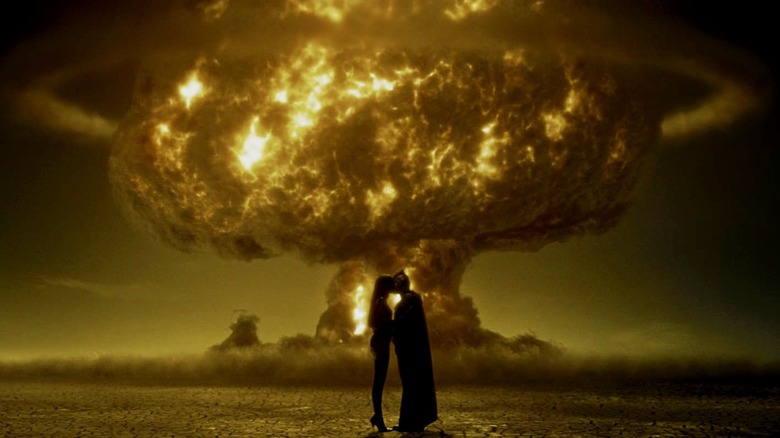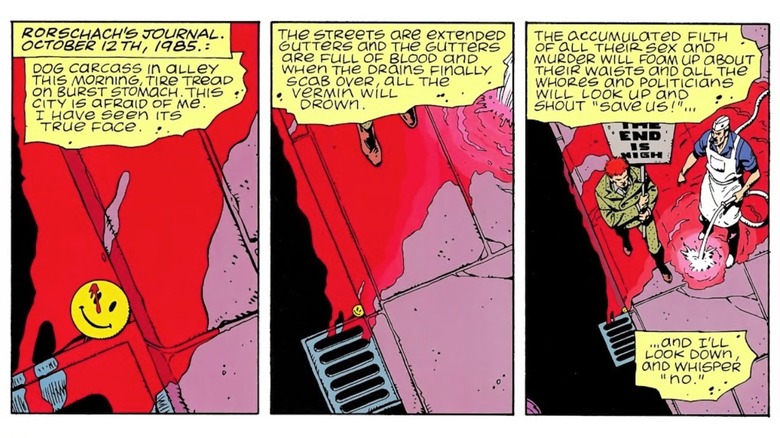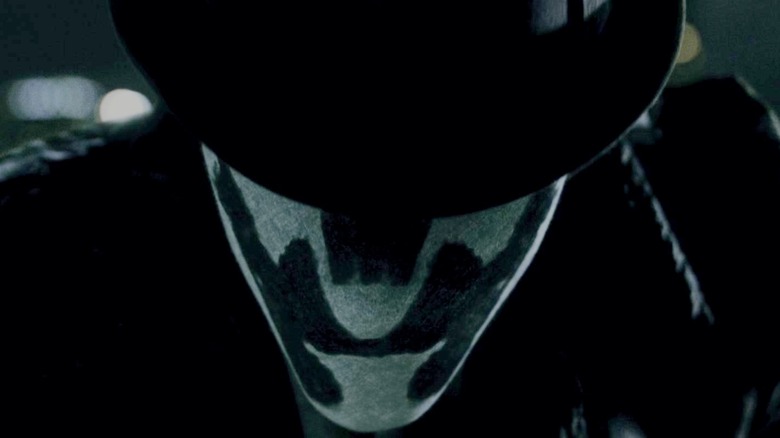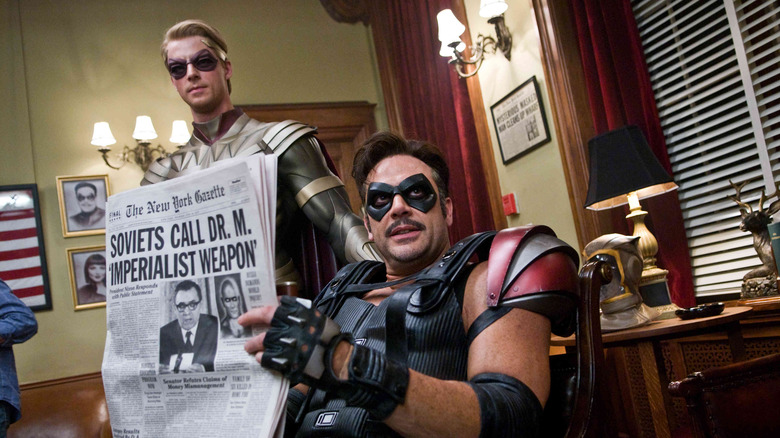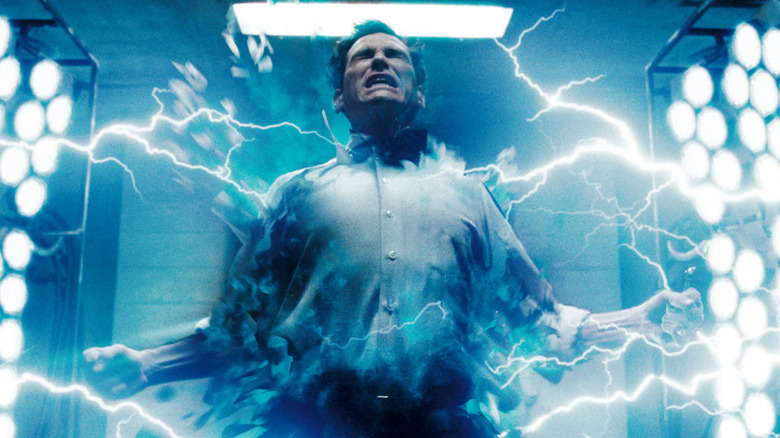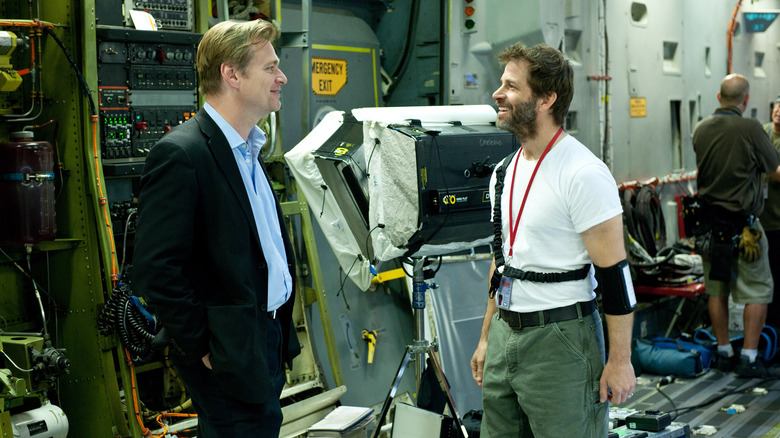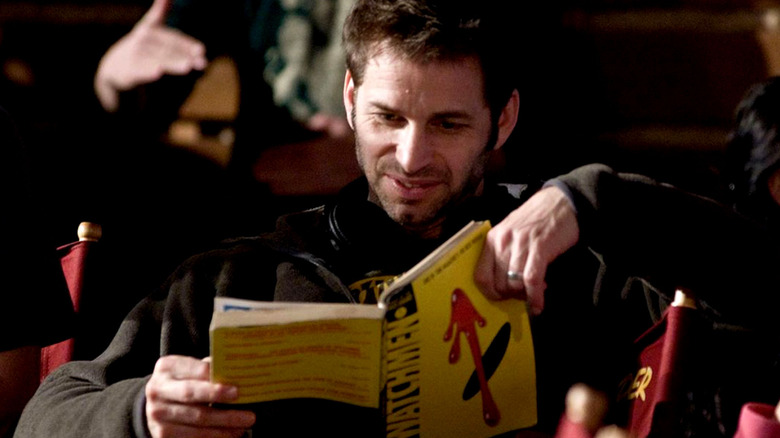Zack Snyder's Watchmen Was A Box Office Failure, But It Shaped A Decade Of DC Movies
(Welcome to Tales from the Box Office, our column that examines box office miracles, disasters, and everything in between, as well as what we can learn from them.)
If you weren't a fully-grown (or nearly-grown) nerd in summer 2008, it's hard to properly convey the hype that followed the first trailer for Zack Snyder's "Watchmen." Really, you had to be there. But here's a representative bit of trivia: throughout all of 2007, the "Watchmen" graphic novel had sold 100,000 copies; after the trailer dropped, 75,000 copies were sold in the space of a single week. DC Comics had to order a print run of more than a million copies in 2008 just to keep up with demand.
"As far as we can tell from our conversations with the book industry people, there has never been a trailer that did this," Paul Levitz, then-president of DC, told the New York Times. The impact of that first "Watchmen" trailer remains unmatched. The golden age of superhero movies may have carried the box office for a decade, but it hasn't really led to a boost in sales for either Marvel or DC Comics.
What this meant for Warner Bros., DC's parent company, was that "Watchmen" was generating a return on investment months before the movie itself actually hit theaters. Stories like this are an important reminder that box office numbers aren't always the final word on a movie's success.
So why did "Watchmen" disappoint at the box office after all that hype? And why did it end up becoming the blueprint for the DC Extended Universe anyway? Let's dig in, shall we?
Watchmen, the graphic novel
Undoubtedly a major reason why the "Watchmen" trailer boosted sales of the source material, in a way that other comic book movies haven't, is that Alan Moore and Dave Gibbons' original work had long being available as a single-volume graphic novel. Not only does "graphic novel" sound a lot more serious and grown-up than "comic book," but it also promises a self-contained story rather than decades of sprawling, tangled canon. While comic book sales have stagnated over the last decade, graphic novel sales have seen a major boom.
First published in 1986-87, "Watchmen" was a postmodern take on established superhero tropes that asked awkward but interesting questions like, "How exactly would superheroes operate alongside a government's army?" and "Is dressing up in a costume and punching low-level thugs really the best tactic for a billionaire trying to make the world a better place?" It took the escapist fantasy of being a superhero and smashed it into the very world it was trying to escape from. In "Watchmen," superheroes change the course of the Vietnam War through horrifying violence. They embrace the celebrity lifestyle and abuse the trust they're given. They ignore the justice system and appoint themselves judge, jury, and executioner. The story is a stark warning against putting too much faith in those who have too much power.
Together with Frank Miller's similarly grim and gritty comic "Batman: The Dark Knight Returns," sales of "Watchmen" helped DC Comics briefly overtake Marvel Comics in 1987. That same year, Marvel launched "The Punisher" as a standalone title and, in response to its enormous popularity, launched "Punisher War Journal" the year after that. "Watchmen" may have been a standalone story, but Frank Castle delivered his own brand of bloody vigilantism to those who thirsted for more.
"I didn't really think that superheroes were adult fare," Alan Moore said in a 2022 interview, reflecting on the "Comics Have Grown Up" headlines that began appearing in response to these dark tales. "It wasn't comics growing up. I think it was more comics meeting the emotional age of the audience coming the other way."
The trailer
How does a movie trailer sell a million copies of a graphic novel? Well, it helps to start with a great song.
Smashing Pumpkins' "The End is the Beginning is the End" was originally written for Joel Schumacher's 1997 movie "Batman & Robin" (yes, the one with the Bat-nipples and the Bat-Credit Card). "For me, it was a great kind of artistic thing to do because it was very freeing," songwriter and lead singer Billy Corgan said in an MTV interview. "I wasn't talking about myself or trying to represent the Smashing Pumpkins. I was trying to represent Batman."
Corgan enjoyed the creative process so much that he wrote three other versions of the song: two instrumental versions, and a slowed-down, moodier lyrical version titled "The Beginning is the End is the Beginning." It was this last version that was used for the "Watchmen" trailer.
Like all great trailers, it tells you almost nothing about the story. It's also deliberately cut to the music, with the ticking rhythm of the Smashing Pumpkins motif neatly complementing the clock motif that's central to "Watchmen." The trailer leans heavily on visuals, with Snyder's adoration of the source material delivering shots that look like the original comic panels brought to life. There's almost no dialogue: only Jeffrey Dean Morgan's ominous mutter of "God help us all," and then at the end, Rorschach's most famous quote.
Fans were hyped. People who'd never heard of "Watchmen" before were hyped. Everyone was hyped! So, did the movie live up to the hype?
The movie: Watchmen
"Not really," says the 65% score on Rotten Tomatoes. The B CinemaScore that "Watchmen" got from exit polling of opening night audiences concurs. There's a case to be made that "Watchmen" could never have fully lived up to the hype. This was a movie that took 22 years to make it to the big screen, with Terry Gilliam, Darren Aronofsky, and Paul Greengrass all attached to direct it at one point or another, and the rights being juggled by various Hollywood studios (Warner Bros. and Fox were still arguing over the rights just a few months before the movie's release).
On the other hand, perhaps 22 years wasn't quite long enough. "I've always believed 'Watchmen' was ahead of its time," mused Christopher Nolan, director of the "Dark Knight" trilogy, in an email to the Hollywood Reporter last year. "The idea of a superhero team, which it so brilliantly subverts, wasn't yet a thing in movies. It would have been fascinating to see it released post-'Avengers.'"
The story is set in an alternate history version of 1985, where superheroes (most notably, a manmade god called Dr. Manhattan) altered the course of world events both during and after the Second World War. Following a period of civil unrest provoked by the existence of superheroes in the 1970s, the U.S. government has banned all non-approved superhero activity. Some superheroes retired. Some secretly nurture dreams of getting back into the action. Then there's inkblot-masked vigilante Rorschach, who never stopped at all. When a former superhero known as the Comedian is murdered, Rorschach is determined to find out why — and tugging on that thread unravels a great big yarn ball of conspiracy.
The financial journey
With a production budget of around $120 million, "Watchmen" was one of the most expensive R-rated films ever made — and with that budget came pressure to perform at the box office. Early projections pointed to an opening weekend of $70 million or more, which would have put "Watchmen" on par with Snyder's 2006 film "300." That comic book-inspired take on the Battle of Thermopylae ultimately went on to gross $456 million worldwide, and Warner Bros. would no doubt have been very happy with similar results.
Unfortunately, "Watchmen" fell far short of those expectations with a $55.6 million opening weekend. That wasn't inherently a death sentence; with strong enough legs, movies can recover from a damp box office debut. ("The Hangover," released the same year, opened to $44.9 million and went on to gross $468 million globally.) But "Watchmen" dropped a painful 67.7% in its second weekend at the box office, where it was knocked off the No. 1 spot by the Dwayne Johnson-led Disney movie "Race to Witch Mountain." Among audiences old enough to see an R-rated movie it also faced fresh competition from horror remake "The Last House on the Left."
Things didn't get any better the next weekend, when "Watchmen" dropped another 61.8%. Snyder's film didn't get steamrolled by any big tentpole releases. Instead, it got steadily trampled by a crowd that also included the Nicolas Cage sci-fi thriller "Knowing" and Tony Gilroy's "Duplicity." Despite not living up to the studio's box office hopes (it failed to break even in theaters, grossing $185.6 million by the end of its run), "Watchmen" has undoubtedly had the biggest cultural impact of the movies that hit theaters in March 2009.
So why didn't it make more money? What happened to all that insane hype from when the first trailer dropped eight months previously? Well ... eight months happened. That's more than enough time for hype to cool off. The second trailer had some cool music too (courtesy of Philip Glass and Muse), but it followed a more generic formula and was packed with exposition-y dialogue. After word got around that the movie itself was kind of disappointing compared to the original trailer, it's no surprise that "Watchmen" showings weren't packed to the rafters.
Why did Warner Bros. hand the DCEU to Zack Snyder after Watchmen flopped?
Short answer: they didn't. The DCEU didn't exist as a concept when "Man of Steel" first went into development in 2008, which was the same year that Christopher Nolan's "The Dark Knight" made more than a billion dollars at the box office. At the time, it was the highest-grossing superhero movie ever made. So, when Nolan pitched an idea for a Superman movie to the studio, based on discussions with his "Dark Knight" trilogy co-writer David S. Goyer, Warner Bros. practically bit his hand off. Nolan signed on as a producer, Goyer was hired to write the script, and all that was left was to find a director (Nolan still had to deliver "The Dark Knight Rises" for 2012, so he couldn't do it).
A number of famous names were considered for the director's chair on "Man of Steel," from Guillermo del Toro to Ben Affleck. But Nolan ultimately settled on young hotshot (44 is young in director years) Zack Snyder. Watching "Watchmen" had convinced him that Snyder had an "innate aptitude for dealing with superheroes as real characters." As Nolan explained to the New York Times in 2013, "That was what a new approach to Superman required. He understands the power of iconic images, but he also understands the people behind them." Warner Bros. had a billion reasons to trust Nolan's judgment, so Snyder was brought on board as a director in 2010.
Even without Nolan's endorsement, Snyder was a smart choice. "300" was a massive box office success that came out of nowhere. "Watchmen" may have flopped, but it was far from a total disaster, and there were plenty of factors to blame for its underperformance. It was rated R, it had no well-known movie stars among the cast, and no well-known superheroes among the characters. A studio exec could easily conclude that the style of "Watchmen" applied to a famous character like Superman and sanded down to a four-quadrant-friendly PG-13 rating was the perfect recipe for box office success. And they would be proven right when Snyder's "Man of Steel" grossed $670 million worldwide — almost $300 million more than Nolan's DC debut, "Batman Begins," had made.
Meanwhile, over in Marvelville, "The Avengers" had grossed a truly absurd $1.5 billion at the box office, stealing the crown for highest-grossing superhero movie from "The Dark Knight" by a considerable margin. It's little wonder that Warner Bros. caught the cinematic universe fever. "What Zack and Chris have done with this film is allow you to really introduce other characters into the same world," Warner Bros. Pictures Group's then-president Jeff Robinov teased in an interview with Entertainment Weekly.
The studio wanted its own comic book mega-franchise, and Snyder was already in the studio, revving his engines. After "Man of Steel" succeeded, Warner Bros. fired the starting pistol for him. Frankly, it would have been stupid not to.
The lessons contained within
Perhaps the biggest lesson here is not for Hollywood, but for observers of Hollywood: hindsight is 20/20. It's easy to look back from the lofty vantage point of 2024 and say that Warner Bros. made a mistake in handing creative control of the DC Extended Universe to Snyder. But doing so places an unfair portion of blame for the franchise's troubles at Snyder's door. (Warner Bros.' parent company underwent a massive corporate acquisition followed by a massive corporate merger during the DCEU's lifetime, which is bound to cause some turbulence.) It also ignores the success stories of the DCEU, including an "Aquaman" movie that grossed a billion dollars at the box office and an overall franchise gross north of $7 billion.
If the studio bosses did make a mistake, it was in seeing Snyder not as he was — a director with lots of passion, a strong vision, and a proven (if somewhat mixed) track record of delivering on those things — but as what they needed him to be: the DC version of Marvel Studios boss Kevin Feige. "I never looked at it as the job, 'Oh, I'm the architect of DC. I need to create entertainment for DC that sells toys and that is for the masses and fun for everyone," Snyder reflected in an interview with the Hollywood Reporter last year. "I didn't care [about that]. I liked Batman, I liked Superman, I wanted to make something cool. You picked the wrong guy if you wanted a product."
As for "Watchmen," if nothing else it was a success story by Snyder's own metric. Speaking to the L.A. Times at San Diego Comic-Con 2008 — where the gathered crowd was still riding the high of the first trailer, "Watchmen" was the hottest Hall H ticket in town, and there was every reason to believe it was going to blow the box office away — the director nonetheless had humble ambitions. "If I just end up making a three-hour advertisement for the graphic novel," said Snyder. "I've done my job."
